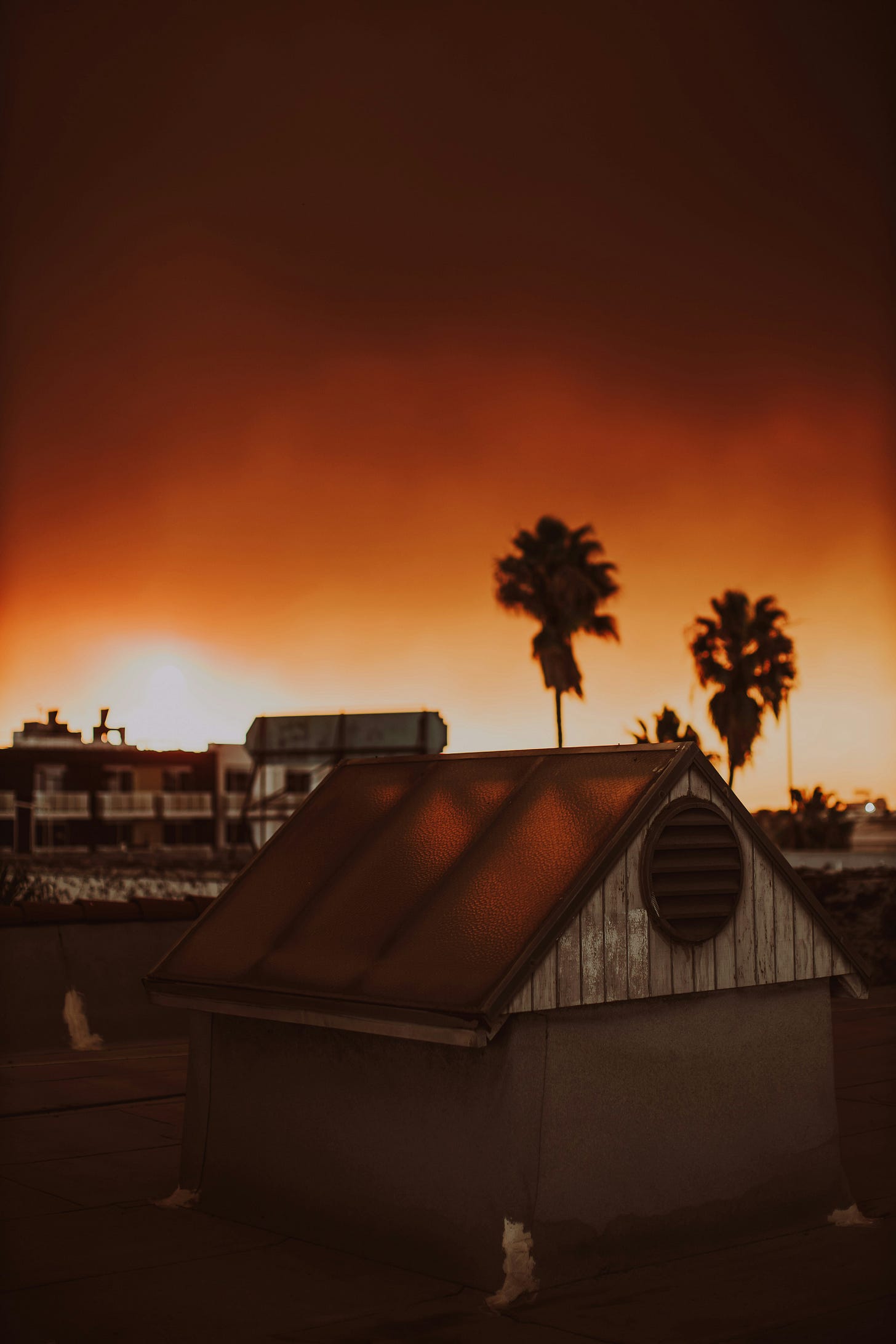Photo credit: Jessica Christian on Unsplash
Well, 2025 is off to a feisty start. Shocking, devastating wildfires, earthquakes, dramatic dawn recoveries of just-released journalists, we look set for a wild ride. There is a lot going on that can easily influence our thinking, feeling and doing without us even noticing, not least for the way in which events are reported in the media. It’s prompting me to reflect more deeply on how we make sense of the world, in order to respond to what we see effectively. And the vital importance of doing that so we create conditions for good things to emerge.
Like many people I’m sure, I’ve been moved, shocked and deeply saddened by the wildfires in LA. Close family lived there for many years so I visited quite regularly and found to my surprise, that I loved it. It was arguably Californian life at its best, though my views on that have changed considerably in more recent times. It’s no surprise that events we are able to relate to personally affect us more than disasters that feel too remote from our own lives, whatever their nature or dimension. It’s also easier then, to put ourselves in the shoes of people who are experiencing great difficulty, just as most of us did during the pandemic.
Having spent time on the beach and on the hills around LA, images and videos of bright red flames and thick, dark smoke feel all too real and close even when I’m the other side of the world. Messages from people I know there appear carefully crafted, and at the same time, just scratch the surface of collective loss in the same way that stories of inadequate PPE did in Covid. Pointing fingers of blame at the ‘other’ side of the political divide, whichever side one sits on, or climate change or budgets for fire services or anything else seem to pour yet more oil on the already rampant flames. They have certainly been making me feel more incensed.
Photo credit: Daniel Schludi on Unsplash
Fire, like all the natural elements, is both incredibly destructive and regenerative in its excess. It’s true that droughts have been increasing and becoming more extreme in the American South-West, as in many other parts of the world. So though has the draining of groundwater – what is pumped out of the ground, rather than available on the earth’s surface in streams, rivers and lakes – to satisfy the US’ most populous state. Not only does it produce more than half of the vegetables and more than three-quarters of the fruit and nuts for American consumption, the value of its global agricultural exports have been increasing steadily over the last 10 years (California Department of Food and Agriculture). Big business, big money.
And wwimming pools are now ubiquitous, no longer a privilege of the uber-rich but a must-have for your average Joe, who most likely also lives in a wooden house, given that Cali is built on and between some of the world’s most potent fault lines. Big dreams, big consumption.
Then a series of environmental laws were approved by the last Democrat administration. Algorithms have informed the decision to limit the use of electric generators because they pollute the air, while seeming to ignore the fact that AI consumes energy at almost the equivalent, terrifying speed that it computes. As a result, electricity companies are obliged to turn the supply off during emergencies, so far fewer water hydrants work, even if groundwater is still available. Burning selective areas of bush and weeds to create boundaries that fire cannot cross because there is nothing to burn is widely considered good, natural management practice. But the desire to see small wildlife while on hikes in the seasons where swimming-pools are less appealing has prompted a banning of this too. I’m curious if people have thought about what happens to them when everything burns.
And finally, because this piece really is not just about political decisions in California, it’s also true that millions have been cut from fire services. There is a strong predilection for all things woke, because after all, decision-makers need to get re-elected. Some 10,000 private firemen and women are hired by insurance companies who have no intention of paying out huge amounts of money on the wooden houses they insure (all of the above – Zuppa di Porro).
I had my first experience of wearing a face mask outside over Thanksgiving 2018 when I last visited my family who had since moved up to north Cal. We needed them. Those particular wildfires were caused by short circuits on low-hanging, ill-maintained power lines which sparked a disaster when it hit dry brush that had not been cleared. Little did we know that facemasks would become obligatory just a few months later. I wonder what investigators in the hiking trails of the Pacific Palisades are going to discover about these events, and how those stories will be told to the world.
“It takes courage to grow up and become who you really are.”
EE Cummings
I was recently struck by a post written by Joe Brewer when he describes how semantic frames are used to shape a discourse, in this case about climate. From his decade-long work using frame analysis, Joe describes the ways in which discourse is often intended to promote the interests of certain actors and disempower the rest, particularly those who believe they have little power to affect change. Iow, you and me, not corporates, institutions or nation-states. In this post, Joe tells how the climate discourse is primarily organised around a few key frames which deeply influence how we think and feel about it, and therefore respond. The first is about the role of elite institutions and their responses – COP, international agreements and presidential elections. The failure of institutions to bring about systemic transformational change is well documented, not least because of all the biases, prejudices and unsound sense-making that is part and parcel of their social fabric.
Second, the climate discourse focuses on carbon markets, credits and offsets, associated market dynamics and tech that offers solutions for corporate organisations – major polluters – to implement and benefit from these. Climate change isn’t a problem with a solution, rather an emergent phenomenon of interdependent life. It cannot be effectively addressed without addressing a whole load of other things at the same time. Many people describe it as a predicament, something which gets worse when there is little holistic understanding and other problems are created as a result. Joe goes on in his post to share a synthesis of how we could easily start to regulate the Earth’s climate through restoring healthy ecosystems, which requires ecological work, local organising and governance and money flows to where it is really needed. Do read the post, because it’s vital work now. I’m going to continue here in a different vein.
Throughout my working life, I have seen some repeating patterns in how we make sense of the world around us and then choose where to go, what to do. Not just in setting organisational strategy or leading transformational change, but also in daily life. There are common frames that we often take for granted as true, or at minimum, popular, that limit and guide our thinking. I see those frames in my own mind, in the choices I make and the actions I take, or not.
A key challenge for me in the last years has been the dwindling of my income streams, like water sources that have slowly, then more rapidly and extensively, dried up. Yes, of course, I could have chosen to actively create new ones – continue with business as usual - but a certain safety net and deeper inner nudges have pointed me elsewhere. That ‘elsewhere’ is gently proving to be far more valuable than any new commercial venture could ever be. I’ve long embodied an autonomous, dynamic, get-things-done energy that could easily be described as alpha and masculine. In my own small world, I’ve achieved quite a lot, with apparently limited resources. However, this energy is giving way to a whole other side of me, one that is receptive, nourishing and relational. I still hesitate to call it the feminine. Life – or consciousness – has stepped in at important moments, when I was weaving new partnerships, starting a new business, getting ready to leave the city and begin a new chapter of life, in every way. It has shown me, by removing the possibilities (and in time, desire) for the masculine to take centre stage, that something else is possible, and it is far more powerful.
If you’ve been reading my posts over the last couple of years, you’ll know that this transformational process has not been easy. It has been a gradual and deep turning over of my inner ground, as I learn to become more stable in the face of strong winds and storms, or fires like those burning in LA. I see this process happening all over the world in different ways. It’s devastating, heart-breaking and deeply regenerative, all at the same time. And it’s clearly well overdue.
Is it time to Restabilize your life, or perhaps your team or group, or in your organisation?
For the month of January, I’m offering a few slots for one-to-one guided reflection on how to do that. If you’d like a regular breathing space, or would prefer something ad-hoc when it feels right, I would be delighted to accompany you in that exploration. Please DM me for details.
Thanks for reading.






